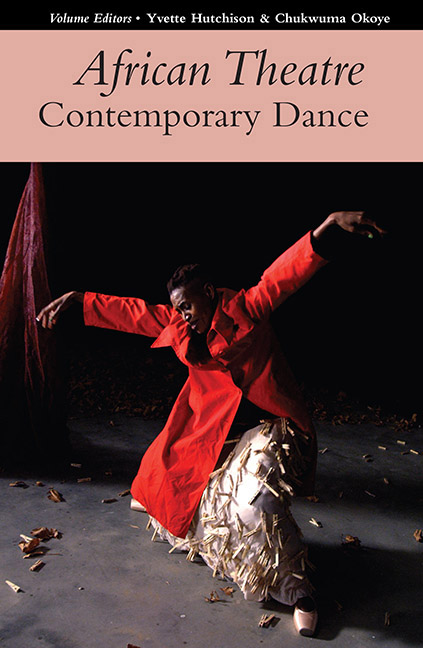Book contents
- Frontmatter
- Contents
- Notes on Contributors
- Introduction
- I Dance
- II Open Section
- Book Reviews
- Valérie K. Orlando, New African Cinema
- Iyunolu Osagie, African Modernity & the Philosophy of Culture in the Works of Femi Euba
- Masitha Hoeane, Mama Mudu's Children: A South African Post-Freedom Tragi-Comedy
- Hope Eghagha, The Oily Marriage
- Ignatius Chukwumah, ed., Joke-Performance in Africa: Mode, Media & Meaning
Valérie K. Orlando, New African Cinema
from Book Reviews
Published online by Cambridge University Press: 26 July 2019
- Frontmatter
- Contents
- Notes on Contributors
- Introduction
- I Dance
- II Open Section
- Book Reviews
- Valérie K. Orlando, New African Cinema
- Iyunolu Osagie, African Modernity & the Philosophy of Culture in the Works of Femi Euba
- Masitha Hoeane, Mama Mudu's Children: A South African Post-Freedom Tragi-Comedy
- Hope Eghagha, The Oily Marriage
- Ignatius Chukwumah, ed., Joke-Performance in Africa: Mode, Media & Meaning
Summary
This book attempts an overview of significant developments and trends that characterize the postcolonial African cinema. The author approaches the discourse from three important epochs that are commonly associated with the postcolonial cinema culture in Africa: the past (1960s–90s), the present (twenty-first century) and the future (projections or conjectures about the directions of African cinematic development).
Structurally, Orlando's New African Cinema consists of four parts: the introduction, the first part, the second part and the conclusion. Thematically, Orlando's discourse uses the representative media of films, videos and television soap operas with examples drawn from different regions of Africa to interrogate some critical issues that surround the production of the moving image in twenty-first century Africa.
The introductory essay begins by ‘acknowledging the colonial past as part of the present’ while observing that ‘contemporary filmmakers no longer solely blame the colonizer for the social woes of their respective societies’ (1–2). The author then identifies technology as a major factor in the evolution of African cinema as typified in the influence of ‘light handheld cameras and digital technologies’. This has empowered the younger generation and emerging cineastes to build an African brand of ‘popular culture’ cinema. Another significant influence is the nature of the African cinema content which is dedicated to offering sociocultural and political messages to the audiences; hence African film ‘is never made purely for entertainment’ but mostly ‘for sociopolitical critique’ (3).
However, when these African films are produced, the distribution network becomes a challenge due to the scarcity of viable theatres on the continent. The author suggests that ‘the solution to the lack of cinemas lies in taking back control of distribution and screening rights that influence local markets for their films’ (7).
The problem of contextualizing or framing African films in terms of region of the filmmaking is also highlighted by Orlando who contends that ‘geographical, linguistic and ethnic divisions have consistently defined Africa’ as well as ‘the films made there’ (12). Hence, the author argues that Africa should not be treated as ‘one huge geographical landmass’ in order to avoid misconceptions, ‘neo-colonial markers’ and ‘blanket stereotypes’ in discussing her cinematic cultures.
- Type
- Chapter
- Information
- African Theatre: Contemporary Dance , pp. 219 - 223Publisher: Boydell & BrewerPrint publication year: 2018



